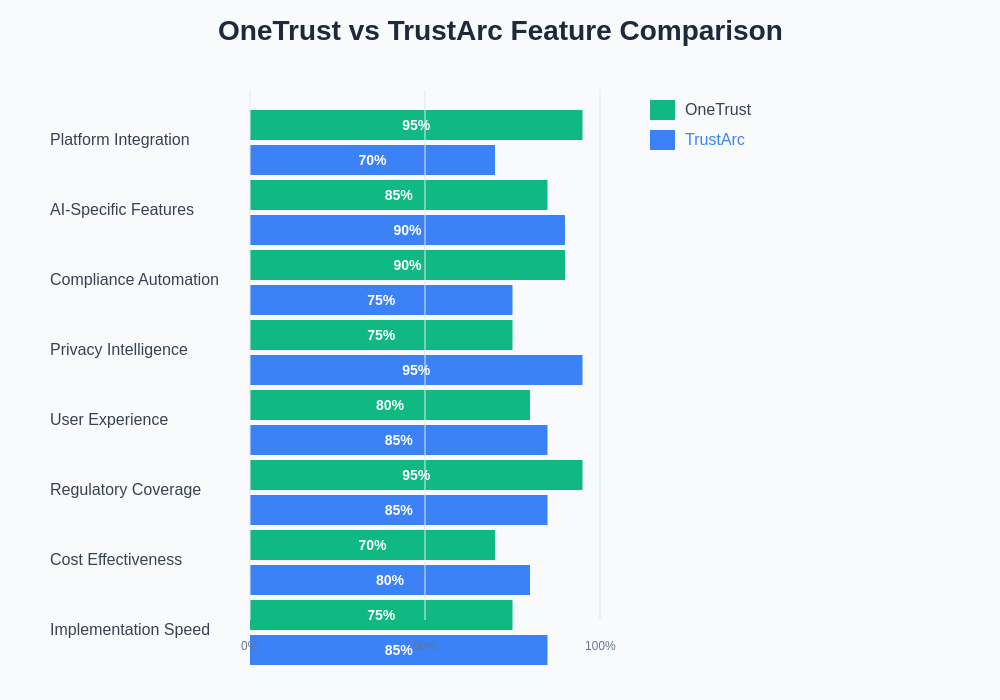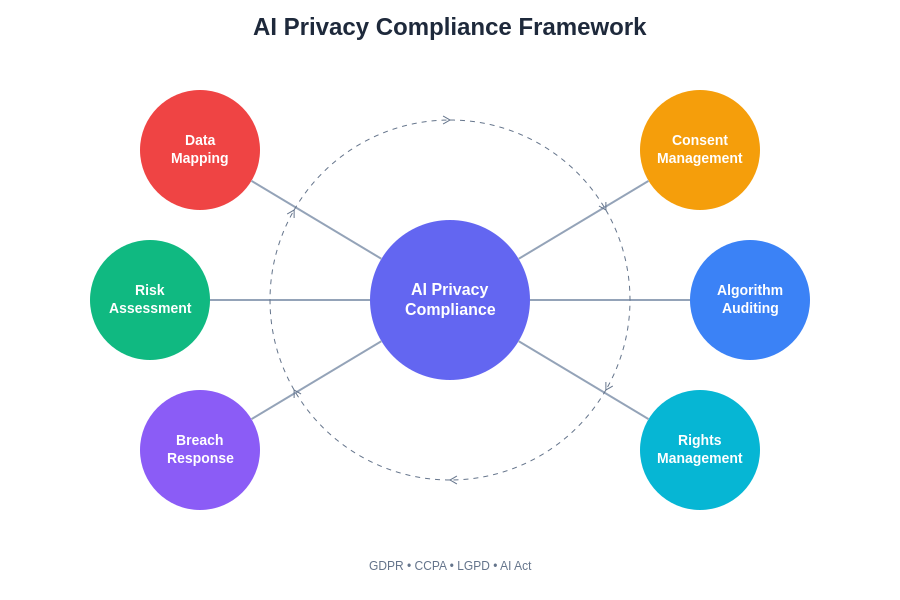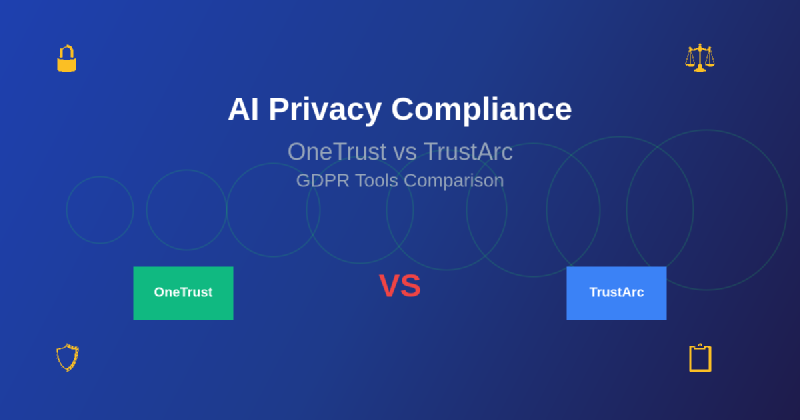The intersection of artificial intelligence and data privacy regulation has created unprecedented compliance challenges for organizations operating in the European Union and beyond. As AI systems increasingly process vast amounts of personal data, the need for sophisticated privacy compliance tools has become paramount. Two industry leaders, OneTrust and TrustArc, have emerged as the dominant solutions for organizations seeking comprehensive GDPR compliance frameworks specifically tailored for AI-driven environments.
Explore the latest AI privacy trends and regulatory developments to understand how evolving regulations are shaping the future of AI compliance strategies. The complexity of modern AI systems, combined with stringent regulatory requirements, demands robust privacy management platforms that can adapt to changing legal landscapes while maintaining operational efficiency.
The Evolution of AI Privacy Compliance
The General Data Protection Regulation has fundamentally transformed how organizations approach data privacy, particularly in the context of artificial intelligence applications. Traditional privacy compliance tools were designed for relatively straightforward data processing scenarios, but the advent of machine learning algorithms, automated decision-making systems, and complex AI architectures has necessitated more sophisticated compliance frameworks that can handle the nuanced requirements of AI-driven data processing.
The challenge extends beyond simple data collection and storage to encompass algorithmic transparency, automated decision-making rights, and the complex data lineage tracking required for AI model training and deployment. Organizations must now demonstrate not only that they collect and process personal data lawfully but also that their AI systems operate within the bounds of privacy regulations while maintaining the effectiveness and accuracy that makes AI valuable for business applications.
OneTrust: Comprehensive Privacy Platform
OneTrust has established itself as a comprehensive privacy management platform that addresses the full spectrum of GDPR compliance requirements with particular strength in AI-specific privacy challenges. The platform’s architecture is designed to handle the complexity of modern AI systems while providing intuitive interfaces for privacy professionals and technical teams alike.
The OneTrust platform excels in its ability to integrate with existing AI infrastructure, providing real-time monitoring of data flows, automated consent management, and sophisticated data mapping capabilities that are essential for AI compliance. The system’s strength lies in its comprehensive approach to privacy management, offering modules for consent management, data discovery, privacy impact assessments, and vendor risk management that work seamlessly together to create a unified compliance ecosystem.
OneTrust’s AI-specific features include automated data lineage tracking for machine learning pipelines, algorithmic impact assessments, and sophisticated consent preference management that can handle the complex consent scenarios typical in AI applications. The platform’s reporting capabilities provide detailed compliance dashboards that enable organizations to demonstrate regulatory compliance while identifying potential privacy risks before they become violations.
Experience advanced AI privacy solutions with Claude for intelligent analysis of privacy compliance requirements and automated policy generation tailored to specific AI use cases. The integration of AI-powered analysis tools enhances the effectiveness of privacy compliance programs by providing proactive risk identification and mitigation strategies.
TrustArc: Specialized Privacy Intelligence
TrustArc approaches privacy compliance from a more specialized perspective, focusing on privacy intelligence and risk assessment capabilities that are particularly valuable for complex AI implementations. The platform’s strength lies in its deep understanding of privacy law nuances and its ability to translate complex regulatory requirements into actionable compliance frameworks for AI systems.
The TrustArc platform distinguishes itself through its sophisticated privacy risk assessment capabilities, which are specifically designed to handle the unique challenges posed by AI systems. The platform provides detailed privacy impact assessment tools that can evaluate the privacy implications of machine learning algorithms, automated decision-making processes, and complex data processing workflows that are common in AI applications.
TrustArc’s approach to AI privacy compliance emphasizes legal expertise and regulatory intelligence, providing organizations with detailed guidance on compliance strategies that are specifically tailored to their AI use cases. The platform’s strength lies in its ability to provide contextual compliance guidance that takes into account the specific regulatory environment, industry requirements, and technical architecture of each organization’s AI systems.
Feature Comparison and Technical Capabilities
When comparing OneTrust and TrustArc for AI privacy compliance, several key differentiators emerge that can significantly impact an organization’s compliance strategy and operational effectiveness. OneTrust provides a more comprehensive platform approach with extensive integration capabilities, while TrustArc offers specialized expertise in privacy risk assessment and regulatory intelligence.
OneTrust’s technical architecture is designed for scalability and integration, making it particularly suitable for large organizations with complex AI infrastructures that require seamless integration with existing systems. The platform’s API-first approach enables sophisticated customization and automation capabilities that are essential for organizations with high-volume data processing requirements and complex AI workflows.
TrustArc’s technical capabilities focus more on privacy intelligence and risk assessment, providing detailed analysis tools that help organizations understand the privacy implications of their AI systems and develop appropriate compliance strategies. The platform’s strength lies in its ability to provide expert guidance and contextual compliance recommendations that are specifically tailored to the unique privacy challenges posed by AI applications.

The feature comparison reveals distinct strengths in each platform, with OneTrust excelling in comprehensive privacy management and system integration, while TrustArc provides superior privacy intelligence and specialized AI compliance guidance. Organizations must carefully evaluate their specific requirements, technical architecture, and compliance objectives when selecting between these platforms.
Implementation Strategies and Best Practices
Successful implementation of AI privacy compliance tools requires careful planning, stakeholder alignment, and a clear understanding of both technical requirements and regulatory obligations. Organizations implementing OneTrust or TrustArc must develop comprehensive implementation strategies that address technical integration, user training, process optimization, and ongoing compliance monitoring.
The implementation process typically begins with a comprehensive assessment of existing AI systems, data flows, and privacy practices to identify gaps and prioritize compliance activities. This assessment phase is critical for determining the scope of implementation, identifying integration requirements, and establishing success metrics for the privacy compliance program.
OneTrust implementations typically focus on comprehensive platform deployment with extensive customization and integration work to ensure seamless operation within existing technical architectures. The platform’s modular approach enables phased implementations that can begin with core privacy management capabilities and expand to include specialized AI compliance features as organizations mature their privacy programs.
TrustArc implementations often emphasize privacy program optimization and expert guidance, focusing on developing sophisticated privacy risk assessment capabilities and establishing robust compliance frameworks that are specifically designed for AI applications. The platform’s strength in privacy intelligence makes it particularly valuable for organizations that need detailed regulatory guidance and specialized compliance expertise.
Leverage Perplexity’s advanced research capabilities to stay current with evolving privacy regulations and compliance requirements that impact AI systems across different jurisdictions and industries. Continuous monitoring of regulatory developments is essential for maintaining effective privacy compliance programs in rapidly evolving legal environments.
Cost Considerations and ROI Analysis
The financial implications of implementing comprehensive AI privacy compliance tools extend beyond initial licensing costs to include implementation services, ongoing maintenance, training requirements, and the opportunity costs associated with compliance activities. Organizations must carefully evaluate the total cost of ownership for both OneTrust and TrustArc while considering the potential financial impact of privacy violations and regulatory penalties.
OneTrust’s pricing model typically reflects its comprehensive platform approach, with costs varying based on the modules implemented, user count, and integration requirements. The platform’s scalability enables organizations to start with core capabilities and expand functionality as their privacy programs mature, potentially reducing initial implementation costs while providing a clear upgrade path.
TrustArc’s pricing structure often reflects its specialized expertise and privacy intelligence capabilities, with costs that may be justified by the platform’s ability to reduce privacy risk and provide expert compliance guidance. The platform’s focus on privacy intelligence and risk assessment can provide significant value for organizations operating in highly regulated industries or complex regulatory environments.
The return on investment for privacy compliance tools must be evaluated in terms of risk mitigation, operational efficiency, and competitive advantage. Organizations that implement comprehensive privacy compliance programs often experience reduced regulatory risk, improved customer trust, and enhanced operational efficiency that can justify the investment in sophisticated compliance tools.
Integration Challenges and Technical Requirements
The technical complexity of integrating privacy compliance tools with existing AI infrastructure presents significant challenges that organizations must carefully address during implementation planning. Both OneTrust and TrustArc require sophisticated integration capabilities that can handle the complex data flows, system architectures, and operational requirements typical in AI environments.
OneTrust’s integration capabilities are extensive, providing APIs, connectors, and integration tools that enable seamless connection with existing AI systems, data platforms, and business applications. The platform’s technical architecture is designed to handle high-volume data processing and complex workflow automation that are essential for AI privacy compliance.
TrustArc’s integration approach focuses more on privacy-specific connections and compliance workflow integration, providing specialized tools for connecting privacy assessment processes with existing AI development and deployment workflows. The platform’s integration capabilities are designed to enhance privacy program effectiveness rather than provide comprehensive system integration.
Organizations must carefully evaluate their technical requirements, existing system architecture, and integration capabilities when selecting between OneTrust and TrustArc. The choice between platforms often depends on whether an organization prioritizes comprehensive platform integration or specialized privacy expertise and intelligence.
Regulatory Compliance and Industry Standards
Both OneTrust and TrustArc provide comprehensive support for GDPR compliance, but their approaches to regulatory adherence and industry standards differ in ways that can significantly impact organizational compliance strategies. Understanding these differences is crucial for organizations operating in regulated industries or complex compliance environments.
OneTrust provides extensive support for multiple privacy regulations beyond GDPR, including CCPA, LGPD, and emerging privacy laws worldwide. The platform’s comprehensive approach to regulatory compliance makes it particularly suitable for multinational organizations that must comply with diverse privacy regulations across different jurisdictions.
TrustArc’s regulatory expertise is particularly strong in privacy law interpretation and compliance strategy development, providing detailed guidance on complex regulatory requirements and their application to AI systems. The platform’s strength lies in its ability to provide expert analysis of regulatory obligations and their practical implementation in AI environments.

The comprehensive privacy compliance framework illustrates the interconnected nature of privacy compliance requirements in AI systems, highlighting the need for sophisticated tools that can address multiple regulatory obligations while maintaining operational effectiveness and technical performance.
User Experience and Training Requirements
The user experience and training requirements for privacy compliance platforms significantly impact adoption success and ongoing effectiveness. Both OneTrust and TrustArc require substantial user training and change management efforts, but their approaches to user experience and platform usability differ in important ways.
OneTrust’s user interface is designed for comprehensive privacy management, providing detailed dashboards, reporting tools, and workflow management capabilities that serve both privacy professionals and technical teams. The platform’s extensive functionality requires significant training investment but provides powerful capabilities for users who master its features.
TrustArc’s user experience emphasizes privacy expertise and guidance, providing interfaces that are designed to help users understand complex privacy requirements and develop appropriate compliance strategies. The platform’s approach to user experience focuses on providing expert guidance and contextual compliance assistance.
Training requirements for both platforms are substantial, requiring organizations to invest in comprehensive training programs that address both technical platform capabilities and privacy compliance expertise. The success of privacy compliance implementations often depends more on effective training and change management than on technical platform capabilities.
Future Developments and Technology Roadmaps
The rapidly evolving landscape of AI privacy regulation and compliance technology requires organizations to consider future developments and technology roadmaps when selecting privacy compliance platforms. Both OneTrust and TrustArc are continuously evolving their platforms to address emerging regulatory requirements and technological developments.
OneTrust’s roadmap emphasizes platform expansion and integration capabilities, with ongoing development of AI-specific features, enhanced automation capabilities, and expanded regulatory coverage. The platform’s comprehensive approach positions it well for addressing emerging privacy challenges and regulatory requirements.
TrustArc’s development focus centers on privacy intelligence and expert guidance capabilities, with ongoing enhancement of risk assessment tools, regulatory analysis capabilities, and specialized compliance guidance for emerging technologies and regulatory frameworks.
Organizations must consider these future developments when making platform selection decisions, evaluating how each platform’s roadmap aligns with their long-term privacy compliance objectives and emerging regulatory requirements.
Making the Strategic Choice
The decision between OneTrust and TrustArc for AI privacy compliance ultimately depends on organizational priorities, technical requirements, compliance objectives, and available resources. Organizations must carefully evaluate their specific needs and circumstances to determine which platform provides the best alignment with their privacy compliance strategy.
OneTrust is typically the better choice for organizations that prioritize comprehensive platform capabilities, extensive integration requirements, and scalable privacy management across multiple business units and regulatory jurisdictions. The platform’s comprehensive approach makes it particularly suitable for large organizations with complex AI infrastructures and diverse compliance requirements.
TrustArc may be more appropriate for organizations that prioritize privacy expertise, specialized compliance guidance, and sophisticated risk assessment capabilities. The platform’s focus on privacy intelligence makes it particularly valuable for organizations operating in highly regulated industries or complex compliance environments where expert guidance is essential.
The choice between platforms should be based on a comprehensive evaluation of organizational requirements, technical capabilities, compliance objectives, and long-term strategic goals. Both platforms provide robust capabilities for AI privacy compliance, but their different approaches and strengths make them suitable for different organizational contexts and requirements.
Disclaimer
This article is for informational purposes only and does not constitute legal or professional advice. Privacy compliance requirements vary by jurisdiction, industry, and specific use case. Organizations should consult with qualified legal and privacy professionals when developing privacy compliance strategies and selecting compliance tools. The effectiveness of privacy compliance platforms may vary depending on implementation approach, organizational context, and specific regulatory requirements.
